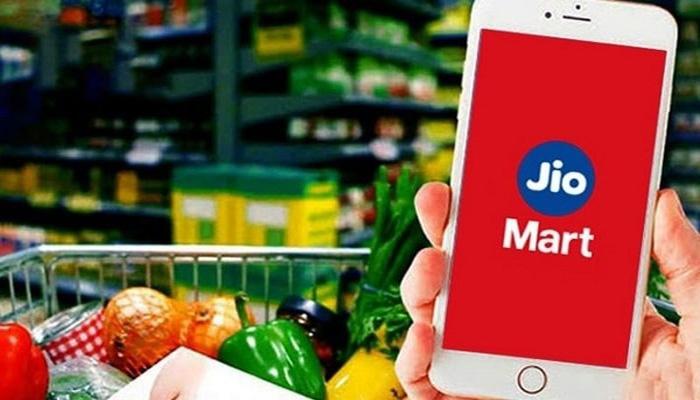Salesmen on Brink of Extinction as Mukesh Ambani Unleashes JioMart on Kirana Stores

Image Courtesy: Newstrack English
In a bid to disrupt the country’s $883 billion retail sector and take on Amazon and Walmart, India’s richest man has unleashed his JioMart Partner app so aggressively that household goods salesman Vipresh Shah feels like a pauper. Once the “prince” of the market, he has failed to sell a single pack of Dettol soap in the last eight days.
“As Reckitt’s distributor, I used to be like a prince in the market. Now, the buyer tells me, ‘See how much you’ve been ripping us off!’”, the 31-year-old, who is an official distributor for Britain’s Reckitt Benckiser in Vita, near Sangli city, around 322 km south of Mumbai, told news agency Reuters.
Shah’s once-loyal customers now prefer Reliance Industries chairman Mukesh Ambani’s JioMart Partner app, through which they can order the same soap at 15% lower price. Shah, who had his group of loyal customers since he took over his family business 14 years ago, has lost almost Rs 15,000 of his own money in matching the discounts offered by JioMart.
Unfortunately for salesmen like Shah, the kirana stores, which account for more than $700 billion of the retail sector, are increasingly turning to JioMart to stock up on foreign and domestic brands. From $883 billion last year, out of which grocery retail accounted for $608 billion, the retail sector is expected to grow to $1.3 trillion by 2024, according to Forrester Research. The sector contributes 10% to gross domestic product and accounts for 8% of employment, according to Invest India, the country’s investment promotion arm.
The JioMart app has thrown a wrench in the supply chain maintained by salesmen employed by around 4,50,000 traditional distributors. Hundreds of thousands of salesmen representing consumer giants—like Reckitt, Unilever and Colgate-Palmolive—who service every corner of India, including 600,000 villages, mostly take orders physically once a week, deliver them to retailers within a couple of days and earn a margin of 3%-5% on product prices.
The mom-and-pop stores are increasingly ordering goods on JioMart, which ensures delivery promised within 24 hours and also offers training on ordering, credit facilities and free product samples for affiliated kirana customers.
Interviews with salespeople, 20 distributors and a trader group with members across the country revealed how they face an existential threat. Several distributors have drastically reduced their workforce or vehicle fleet after sales from door-to-door agents dropped by 20-25% in the last year with shopkeepers partnering with Reliance. For example, Shah, who laid off half of his staff of four, fears the 50-year-old family business might not last beyond six months.
TENSION BOILS OVER
Rattled and angry, traditional distributors have decided to take on Reliance with tensions boiling over into physical confrontation in some cases. Salesmen have blocked some JioMart delivery vehicles in Maharashtra and Tamil Nadu,
“We will employ guerrilla tactics,” says Dhairyashil Patil, president, All India Consumer Products Distributors Federation, which represents 400,000 agents of local and foreign consumer firms. “We will continue to agitate. We want (consumer goods) companies to realise our value,” he told Reuters.
Traditional distributors in Sangli have at times chased down Reliance vehicles and confronted drivers. Sunil Pujari, who works in the city for one JioMart delivery agent, said that he had been warned by his supervisors to immediately alert them if angry distributors stopped vehicles.
Reliance is determined to push ahead with Ambani’s new commerce retail venture, announced in 2018. The conglomerate raised $6.4 billion from marquee investors, including Silver Lake Partners and KKR & Co Inc, by selling a 10% stake.
A source close to Reliance told Reuters that the company is determined to keep expanding its business for kirana stores adding that the group believes its model can coexist alongside the traditional approach.
In 2018, Ambani had said that he eventually wanted to connect 30 million small merchants to the Reliance network. So far, 300,000 merchant partners in 150 cities order consumer goods from Reliance.
PRICING IS KEY
With shoppers increasingly preferring e-commerce due to discounts and the development of rapid delivery, the online retail market, which was worth $30 billion in 2019, is set to expand by an annual 30% to $200 billion by 2026, according to Invest India estimates.
Despite the disruption, industry watchers feel that traditional distribution methods remain important to the consumer goods makers. Himanshu Bajaj, former Asia consumer and retail head, consulting firm Kearney, said that CEOs of consumer firms he met in September raised concerns about Reliance’s strategy. “The companies don’t want to kill their own distributors; the worry is real,” he said.
Sunil D’Souza, CEO, Tata Consumer Products, had told Reuters in an interview last month it “can’t afford to sit back and ignore” any major distribution channel when asked about Reliance’s model and concerns among distributors.
American multinational independent investment bank and financial services company Jefferies estimated in March that kiranas will “steadily increase the share of procurement” from Reliance “at the cost of traditional distributors”. Such sales for Reliance could mushroom to $10.4 billion by 2025 from just $200 million in 2021-22, Jefferies estimated.
An executive working for a Reliance rival company said that Ambani “was spreading his wings very fast” and already has an edge on negotiating prices due to long-standing relationships with consumer good-makers which have for years counted Reliance and its 1,100 supermarkets as a big client. “Brands cannot afford to sideline Reliance; it’s just their sheer purchasing power,” the executive told Reuters.
Colgate salesman Anuruddh Mishra encounters the problems faced by Shah. When he tried to convince kirana store owner Shivkumar Singh to buy from him, the 50-year-old opened his JioMart app. “How can I order from traditional distributors?” he says adding, “The difference in price is huge. Now, I order mostly from Reliance.”
A Reuters review of purchase deals on the JioMart showed that Singh, whose store is in Dharavi, could bulk buy a two-tube combo of Colgate MaxFresh toothpaste for about Rs 115 rupees as against Mishra’s last offer of Rs 154.
“Prices offered by JioMart cannot be matched by anyone,” says Pujari while making another delivery in a crowded market.
Get the latest reports & analysis with people's perspective on Protests, movements & deep analytical videos, discussions of the current affairs in your Telegram app. Subscribe to NewsClick's Telegram channel & get Real-Time updates on stories, as they get published on our website.
























